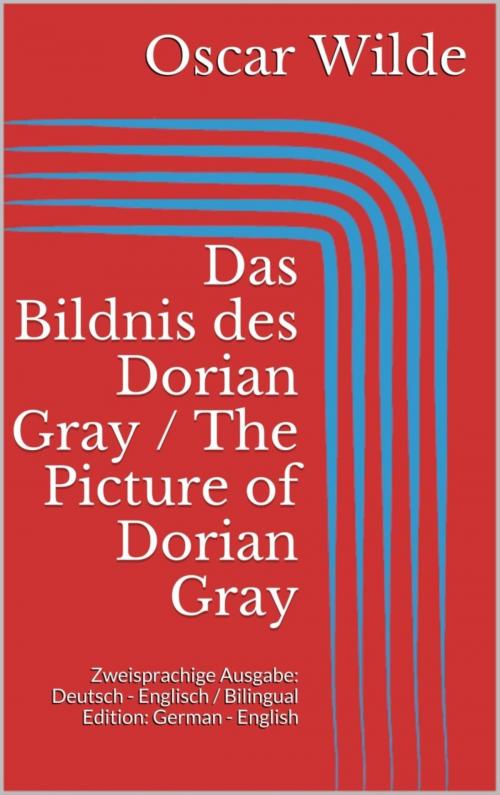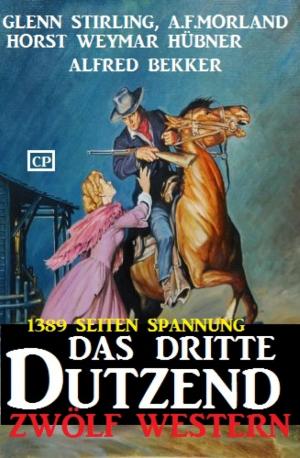Das Bildnis des Dorian Gray / The Picture of Dorian Gray
Zweisprachige Ausgabe: Deutsch - Englisch / Bilingual Edition: German - English
| Author: | Oscar Wilde | ISBN: | 9783736841215 |
| Publisher: | BookRix | Publication: | June 15, 2017 |
| Imprint: | Language: | German |
| Author: | Oscar Wilde |
| ISBN: | 9783736841215 |
| Publisher: | BookRix |
| Publication: | June 15, 2017 |
| Imprint: | |
| Language: | German |
Diese Ausgabe enthält sowohl die deutsche Übersetzung als auch den englischen Originaltext. "Das Bildnis des Dorian Gray" (Originaltitel: "The Picture of Dorian Gray") ist der einzige Roman des irischen Schriftstellers Oscar Wilde. Eine erste Fassung erschien 1890 in Lippincott's Monthly Magazine aus Philadelphia, 1891 wurde bei dem Londoner Verlag Ward, Lock and Co. die heute bekannte, überarbeitete und erweiterte Fassung in Buchform veröffentlicht. Der seinerzeit als anrüchig geltende Roman war auch Gegenstand des Unzuchtprozesses gegen Wilde. Die Hauptfigur, der reiche und schöne Dorian Gray, besitzt ein Porträt, das statt seiner altert und in das sich die Spuren seiner Sünden einschreiben. Während Gray immer maßloser und grausamer wird, bleibt sein Äußeres dennoch jung und makellos schön. Der Roman gilt als Oscar Wildes Prosahauptwerk. Themen sind die Moralität von Sinnlichkeit und Hedonismus im Viktorianismus und die Dekadenz der englischen Oberschicht. Außerdem lassen sich die Handlung und die eingearbeiteten Kunstbemerkungen sowohl als Proklamation wie auch als Kritik des Ästhetizismus lesen, einer literarischen Strömung des Fin de siècle. "The Picture of Dorian Gray" (1891), by Oscar Wilde, was first published as a serial story in the July 1890 issue of "Lippincott's Monthly Magazine". As submitted by Wilde to the magazine, the editors feared the story was indecent, and deleted five hundred words before publication — without Wilde's knowledge. Despite that censorship, "The Picture of Dorian Gray" offended the moral sensibilities of British book reviewers, some of whom said that Oscar Wilde merited prosecution for violating the laws guarding the public morality. In response, Wilde aggressively defended his novel and art in correspondence with the British press. Wilde revised and expanded the magazine edition of "The Picture of Dorian Gray" (1890) for publication as a novel; the book edition (1891) featured an aphoristic preface — an apologia about the art of the novel and the reader. The content, style, and presentation of the preface made it famous in its own literary right, as social and cultural criticism. In April 1891, the editorial house Ward, Lock and Company published the revised version of "The Picture of Dorian Gray". The only novel written by Wilde, "The Picture of Dorian Gray" exists in two versions, the 1890 magazine edition and the 1891 book edition, the story he submitted for serial publication in "Lippincott's Monthly Magazine". As literature of the 19th century, "The Picture of Dorian Gray" is an example of Gothic fiction with strong themes interpreted from the legendary "Faust".
Diese Ausgabe enthält sowohl die deutsche Übersetzung als auch den englischen Originaltext. "Das Bildnis des Dorian Gray" (Originaltitel: "The Picture of Dorian Gray") ist der einzige Roman des irischen Schriftstellers Oscar Wilde. Eine erste Fassung erschien 1890 in Lippincott's Monthly Magazine aus Philadelphia, 1891 wurde bei dem Londoner Verlag Ward, Lock and Co. die heute bekannte, überarbeitete und erweiterte Fassung in Buchform veröffentlicht. Der seinerzeit als anrüchig geltende Roman war auch Gegenstand des Unzuchtprozesses gegen Wilde. Die Hauptfigur, der reiche und schöne Dorian Gray, besitzt ein Porträt, das statt seiner altert und in das sich die Spuren seiner Sünden einschreiben. Während Gray immer maßloser und grausamer wird, bleibt sein Äußeres dennoch jung und makellos schön. Der Roman gilt als Oscar Wildes Prosahauptwerk. Themen sind die Moralität von Sinnlichkeit und Hedonismus im Viktorianismus und die Dekadenz der englischen Oberschicht. Außerdem lassen sich die Handlung und die eingearbeiteten Kunstbemerkungen sowohl als Proklamation wie auch als Kritik des Ästhetizismus lesen, einer literarischen Strömung des Fin de siècle. "The Picture of Dorian Gray" (1891), by Oscar Wilde, was first published as a serial story in the July 1890 issue of "Lippincott's Monthly Magazine". As submitted by Wilde to the magazine, the editors feared the story was indecent, and deleted five hundred words before publication — without Wilde's knowledge. Despite that censorship, "The Picture of Dorian Gray" offended the moral sensibilities of British book reviewers, some of whom said that Oscar Wilde merited prosecution for violating the laws guarding the public morality. In response, Wilde aggressively defended his novel and art in correspondence with the British press. Wilde revised and expanded the magazine edition of "The Picture of Dorian Gray" (1890) for publication as a novel; the book edition (1891) featured an aphoristic preface — an apologia about the art of the novel and the reader. The content, style, and presentation of the preface made it famous in its own literary right, as social and cultural criticism. In April 1891, the editorial house Ward, Lock and Company published the revised version of "The Picture of Dorian Gray". The only novel written by Wilde, "The Picture of Dorian Gray" exists in two versions, the 1890 magazine edition and the 1891 book edition, the story he submitted for serial publication in "Lippincott's Monthly Magazine". As literature of the 19th century, "The Picture of Dorian Gray" is an example of Gothic fiction with strong themes interpreted from the legendary "Faust".















